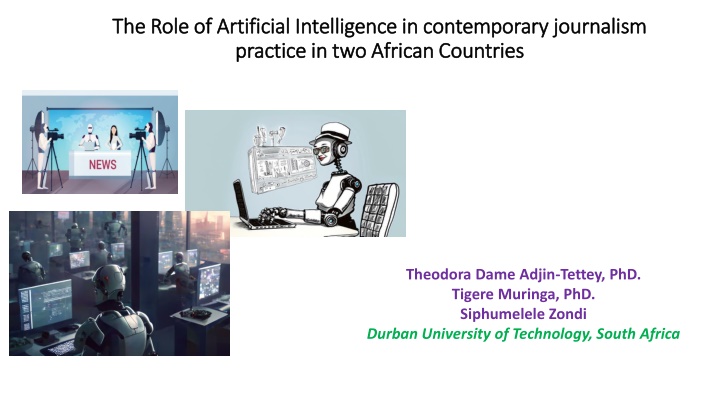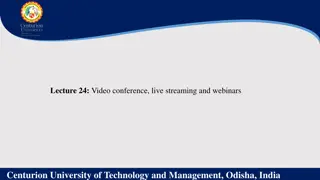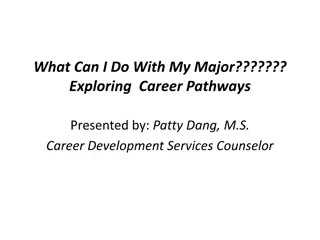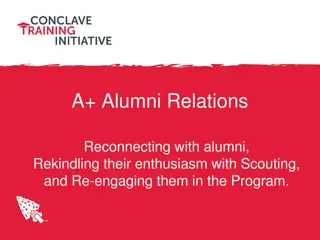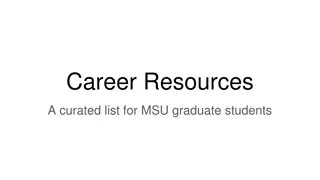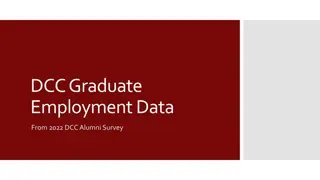Career Webinars & Resources - Explore SFSU Alumni Insights
Engage with insightful career webinars hosted by the Alumni Association at San Francisco State University (SFSU). Get valuable tips on career selection, job search strategies, resume writing skills, and interview techniques. Access additional resources to enhance your career development, including creating a career genogram, conducting informational interviews, and refining your resume and cover letter. Empower yourself with knowledge and guidance to navigate the job market effectively.
Download Presentation

Please find below an Image/Link to download the presentation.
The content on the website is provided AS IS for your information and personal use only. It may not be sold, licensed, or shared on other websites without obtaining consent from the author.If you encounter any issues during the download, it is possible that the publisher has removed the file from their server.
You are allowed to download the files provided on this website for personal or commercial use, subject to the condition that they are used lawfully. All files are the property of their respective owners.
The content on the website is provided AS IS for your information and personal use only. It may not be sold, licensed, or shared on other websites without obtaining consent from the author.
E N D
Presentation Transcript
The Role of Artificial Intelligence in contemporary journalism The Role of Artificial Intelligence in contemporary journalism practice in two African Countries practice in two African Countries Theodora Dame Adjin-Tettey, PhD. Tigere Muringa, PhD. Siphumelele Zondi Durban University of Technology, South Africa
However, AI-based news production practices are still relatively new in Africa. The few studies that have been conducted were mainly situated in Southern Africa (Munoriyarwa et al. 2023; Munoriyarwa and Chiumbu 2024; Makwambeni et al. 2023), East Africa (Dralega 2023; Selnes et al. 2023) with few studies comparing uptake across different sub-Saharan African contexts. A dearth of empirical evidence for how AI is being deployed in African newsrooms (Munoriyarwa et al. 2023) and how journalists and newsrooms negotiate the ethical landscape. The creation, production, and distribution of news products and services have been significantly disrupted by technologically driven approaches in recent years, exposing the value of AI as a tool that can help society address a variety of issues, including the challenges that the news industry faces (de-Lima-Santos and Ceron 2021). 2
How are journalists adopting AI technologies and what challenges and opportunities do such technologies present to them? Sub-research questions What are the ethical challenges associated with the use of AI in journalism practice? What strategies and best practices do journalists and media organisations employ to mitigate the ethical challenges associated with AI-driven tools for journalistic work? What opinions do journalists have about AI's potential implication on job displacement and other future outlooks on how AI will affect journalism? What factors account for the non-adoption of AI in newsrooms? 3
Approach: Qualitative The choice of the two countries: South Africa leads the continent in AI adoption with a robust ecosystem with more than 726 companies in South Africa integrating AI solutions into their operations or developing new solutions using AI (Jaldi 2023). There is upspring adoption of AI in Ghana which is widely reflected in their education, agriculture, security, banking, and health systems (Amegadzie et al., 2021). Instrumentation, sampling, and sampling size The semi-structured interview guide. A total of 18 journalists from South Africa and Ghana purposively selected based on their knowledge, expertise, and/or pertinent knowledge regarding the research subject (Bryman 2016). Data collection and ethical adherence Phone and video conferencing A viable option for qualitative research (Holt 2010; Ward et al. 2015), offering certain methodological advantages, such as convenience, cost- effectiveness, and higher response rate, over in-person interviews (Cachia and Millward 2011). Oral and informed consent was obtained from all participants. 4
AI use in newsrooms limited formal integration in newsrooms. The individual-centred approach to adopting and showcasing the ability to leverage technology for professional purposes. A huge gap in the formal policy and training regarding AI technologies in journalism practices. Tools commonly used ChatGPT, Grammarly, Otter Ai, Canva AI Used at the discretion of the individual journalist more than being systematically integrated into the operations of the media organisation. 5
Truthfully, I think individually, a few of the reporters might use AI for their research work but because of where we are, and what we do especially for local broadcasters [...] it s mostly done on an individual or reporter level. [...] I don't think we use it as much in our newsroom unless I'm doing research on something or I want to find out exactly or want information like you are transcribing. For most of our reporters and newsreaders, everything is in Twi [indigenous Ghanaian Language] but I wouldn t shy away from the fact that they would still need to do a bit of research when they have to (Int 1). Participants demonstrated adaptability to AI, using it primarily for fact-checking, developing story ideas, transcription, and research. ChatGPT for fact-checking, developing story ideas, and researching. Otter.ai for transcription. I've really enjoyed using [AI] for particularly business proposals that I've worked on, and that's outside of the newsroom...but it would be very difficult for me to say I would use it in the newsroom. I probably have done some work where I wanted to do a little bit of research. For instance, when I did a little bit of work on the geography of Ghana I was able to use ChatGPT to figure out how to move around Ghana (Int 11). However, the language of the broadcast of the media organisation sometimes deprives journalists of using even the most basic of such technologies as transcription tools. 6
Opportunities AI presents and future outlooks Opportunities AI presents and future outlooks I've even upgraded myself to chat GPT full just so that I'm able to use other plugins such as Canva. It is time-saving (Int 11) Time efficiency/time-saving, allowing them to focus on more critical aspects of journalism, particularly in fast-paced newsroom environments Stress reduction Enhancement of content quality Automation of routine tasks AI's role in improving the accuracy and speed of fact-checking Not likely to replace humans Well, I don't think that it's gonna oust the human resource aspect or the human interface of journalism completely because when you come to Ghana, for instance, we don't have a localised or domestic AI. [...]. AI may not be able to do justice to stories relating to Ghana as such. [...]. It may have some sort of consequence but not that it will oust people completely (Int 9). I think for me it will take a while before they actually displace people, but those who are not willing to arm themselves with knowledge and understanding of how it works are the ones that are going to be left behind eventually. As it just happened with all the in-dustrial revolutions, if you are not willing to adapt to the changes and you are resistant to a point where you are still doing things the old way because you don't want dis-placement, then you will be left behind (Int 17). 7
Some factors accounting for slow adoption In the workspaces where we find ourselves, we have people who are referred to as slow adopters of fresh ideas...it becomes difficult for us as journalists to deploy these new technologies (Int 14). Resistance to change The high cost of some AI-enabled applications I have not used AI before. I asked my colleagues and they all told me they hadn't used it before. One visual editor said the one he came across was expensive, so he didn't even use it at all (Int 9). 8
AI usage, ethical challenges, ethical AI usage, ethical challenges, ethical considerations, and policy directions considerations, and policy directions There's this idea that anything that comes from AI is not original thought and original thought is what you know makes us smart journalists. And so, I mean, this is why I say I wouldn't be surprised if there were journalists that were using AI but would never say it because I think that they'd be afraid that they would be called non-purist and they wouldn't be seen as strong thinkers, as strong writers, and strong storytellers. So, if people are doing it, there's no way of knowing and they certainly wouldn't come out and say it (Int 16). Perceived dishonorableness associated with using AI in journalism. Concern that AI-generated content might undermine the originality and intellectual rigour expected of journalists. AI s propensity to generate misinformation and perpetuate biases. Issues of intellectual property, with some expressing apprehensions about AI's potential to reproduce content without proper attribution. The error-prone nature of AI tools, particularly regarding their possible lack of sufficient local context background. I remember a court story that a friend of mine did using AI technology recently. AI gave him a different narrative resulting in publishing a false story. His attention was immediately drawn to it. Immediately, he issued a rejoinder to that effect. It nearly resulted in his dismissal had it not been for the intervention of other colleagues, (Int 5). 9
The lack of formal AI policies and guidelines borne out of the informal incorporation of AI tools into journalistic practices. Leads to a reliance on individual discretion and existing journalistic ethics to navigate AI. 10
How ethical challenges are being/can be navigated How ethical challenges are being/can be navigated Promoting mindfulness about ethical use. Comprehensive education on AI applications. AI can help, but we need to double-check everything because it's not always right for our context. [...] If it's not an international story, and it's a local story, AI will not be able to, as it were, give you the facts you want in your local contexts because we know that it's being operated from outside and so they may not be able to give you the local facts as you need Maintaining a high degree of and ethical awareness when utilising AI technologies: Need for rigorous fact-checking and verification; AI tools can be assuming and lack certain information about the local context rendering their output inaccurate. Sometimes, you find that when you go into these platforms, you realise that actually the person who designed this API has got very little knowledge of South Africa. I did an experiment where I put my name on it. It simply just did a lot of guesswork and I think I ended up being a a property developer or something. So if you are going to try and use it to do research about South Africa, you are likely to come up with very basic information (Int 17). Cautioned against overreliance on AI tools and stressed the need for cross-checking information with primary sources to avoid inaccuracies. Careful adaptation and verification of the information generated by AI tools, making sure to uphold accuracy, integrity, and originality in reporting. 11
In the absence of specific guidelines, journalists often revert to traditional ethical principles to guide them while using AI, especially when it comes to maintaining accuracy and integrity. Facebook says when you're broadcasting or you're having a live telecast they can transcribe but I realise that they are even unable to translate the language correctly. Careful optimism related to the reliance on AI real-time online transcribing feature for live radio and television shows aired in indigenous languages streamed for online audiences. I think the biggest challenge that we have is the fact that organisations haven't integrated AI into their strategy. Therefore, you are now left with having to make your own personal decisions about a lot of things. [...]. The issue of attribution and crediting, who do you credit? You take credit for the fact that you've gone to Chat GPT which was able to generate, let's say 15 questions for you in a space of a minute. Who takes credit for all that work? Do you take credit that I did this ? Editorial meetings that interrogate ideas and assist journalists in crafting unique story Formal adoption. Diary meetings interrogate best, interrogate the ideas of the journalist and see if they have not copied them somewhere or they have not sourced them online and not done the groundwork of their own (Int 15). 12
Moderating variables hindering uptake of AI Moderating variables hindering uptake of AI Ethical Concerns and Integrity Journalists express concern about AI compromising journalistic integrity. Risks include plagiarism, misinformation, and the spread of unverified information. Ethical challenges such as algorithmic bias and lack of transparency hinder AI adoption. Example: AI tools have the potential to fabricate information, resulting in false reporting. 13
Fear of Job Displacement Fear of Job Displacement Journalists fear that AI will replace roles such as content production and editing. Automation of routine tasks raises concerns about job security in newsrooms. Example: AI can easily handle press releases and industry news, reducing the need for human oversight. Upskilling opportunities: Journalists could adapt by learning to work alongside AI. 14
Lack of Familiarity and Training Lack of Familiarity and Training Limited formal training on AI tools in newsrooms leads to hesitation and inconsistent use. Journalists often rely on self-education, leading to gaps in AI utilization. A cultural taboo and fear around AI use further contribute to the reluctance to adopt these technologies. Example: Many journalists prefer traditional methods due to a lack of understanding of AI. 15
Bureaucratic Challenges and Limited Bureaucratic Challenges and Limited Resources Resources Newsrooms face bureaucratic hurdles that delay AI integration, including slow approval processes. Resource constraints limit access to advanced AI tools, especially for local broadcasters. Inadequate technological infrastructure and lack of organizational support affect AI uptake. Example: The absence of formal AI policies leads to fragmented and potentially unethical practices. 16
Brief discussion Brief discussion The findings of this study suggest that: The use of AI in African journalism is still emerging and requires structured policy frameworks to address its challenges and maximise its benefits. The individualised use and ethical considerations that come with AI technologies. Findings align with the broader concerns about AI in society, particularly regarding bias, accountability and transparency. The lack of standardised guidelines may lead to inconsistent practices that affect quality and public trust. The need for more comprehensive training and policy development that makes sure that AI is responsibly and effectively utilised in the journalism industry. There appears to be an untapped potential for newsrooms in South Africa and Ghana to use AI to deliver intricate data-driven stories quickly and in an easily comprehensible style. 17
Conclusions Conclusions The cautious approach and varying degrees of AI integration in newsrooms (de-Lima-Santos and Ceron, 2021) and nascent stage of AI adoption (a wait-and-see attitude) (Amegadzie et al., 2021). The usage patterns in both countries also reflect a supplementary approach (Taddeo and Floridi, 2018) rather than a replacement of newsroom routines with AI, as can be found in more advanced countries. It also reflects that in Ghana and South Africa, automated journalism or algorithm journalism (D rr, 2016), including the use of bots in news writing, is yet to find a space in newsroom journalistic routines. Explains why participants did not appear to be concerned that they might be replaced in their chosen field by AI. 18
Beckett (2019) emphasises the role of AIs potential to augment journalistic efficiency and accuracy - reliance on AI to improve tasks like fact-checking and research mirrors findings from Beckett (2019). Participants acknowledged the shortfalls of AI and the ethical ramifications, accounting for their stance that journalists should not be over-dependent on it even in the most basic sense. There may be other uses of AI in news organisations that are not accounted for in this study- AI and data journalism 19
Newsrooms must make the necessary technological investments to realise the benefits of AI adoption. Broader studies across other African nations to understand the varied practices and challenges in different contexts. More broadly, research is needed to determine effective strategies for balancing AI s potential with ethical journalism. 20
Welcome to scan the QR Code and access the full paper Welcome to scan the QR Code and access the full paper 21
Images used: Google Images; Pinterest de-Lima-Santos, Mathias-Felipe, and Wilson Ceron. 2021. Artificial intelligence in news media: Current perceptions and future outlook. Journalism and Media 3:13-26. https://doi.org/10.20944/preprints202110.0020.v1. Dralega, Carol Azungi. 2023. AI and the algorithmic-Turn in journalism practice in Eastern Africa: Perceptions, practice and challenges. Emerald Publishing Limited, Leeds. https://doi.org/10.1108/978-1-80455-135-620231003. Dralega, Carol Azungi, Wise Kwame Osei, Daniel Kudakwashe Mpala, Gezahgn Berhie Kidanu, Bai Santigie Kanu, and Amia Pamela. 2023. A comparative study of AI policy frameworks on journalism practice in Sub-Saharan Africa. In Emerald Publishing Limited,eBooks, 89 102.. https://doi.org/10.1108/978-1-80455-135-620231006. Dralega, Carol .Azungi. Ed.. Digitisation, AI and algorithms in African journalism and media contexts. 2023. Emerald Publishing Limited, Leeds, pp. 89-102. https://doi.org/10.1108/978-1-80455-135-620231006 Kim, Wonchul, and Keeheon Lee. Building ethical ai from news articles. 2020. In 2020 IEEE/ITU International Conference on Artificial Intelligence for Good (AI4G), pp. 210-217. IEEE,.https://doi.org/10.1109/AI4G50087.2020.9311054 Munoriyarwa, Allen, and Chiumbu Sarah. 2024. Artificial intelligence scepticism in news production: The case of South Africa's mainstream news organisations. In Global Journalism in Comparative Perspective (pp. 117-131). Routledge. Munoriyarwa, Allen, Chiumbu Sarah, and Motsaathebe Gilbert. 2023. Artificial intelligence practices in everyday news production: The case of South Africa s mainstream newsrooms. Journalism Practice 17: 1374-1392. Omona, Julius. 2013. Sampling in qualitative research: Improving the quality of research outcomes in higher education. Makerere Journal of Higher Education, 4:169-185. https://doi.org/10.4314/majohe.v4i2.4 Parasie, Sylvain, and ric Dagiral. 2012. Data-driven journalism and the public good: Computer-assisted-reporters and Programmer- journalists in Chicago. New Media & Society 15:853 71. https://doi.org/10.1177/1461444812463345 23
